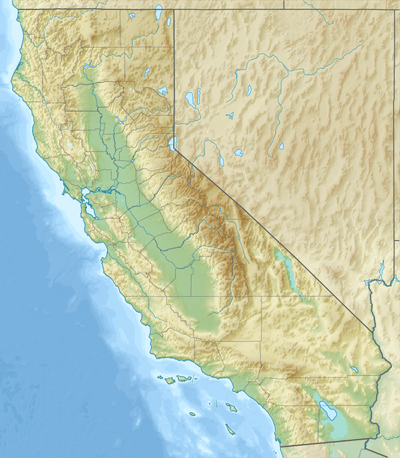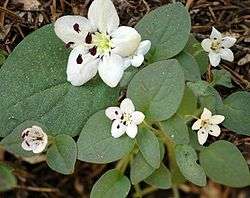Scott Mountains (California)
The Scott Mountains are a subrange of the Klamath Mountains located in Siskiyou County, in northwestern California.[1] A high point is Scott Mountain Summit, a mountain gap-pass at 5,554 feet (1,693 m) in elevation.[2]
| Scott Mountains | |
|---|---|
 location of Scott Mountains in California [1] | |
| Highest point | |
| Elevation | 1,947 m (6,388 ft) |
| Geography | |
| Country | United States |
| State | California |
| Region | Klamath National Forest & Shasta-Trinity National Forest |
| District | Siskiyou County & Trinity County |
| Range coordinates | 41°15′44.527″N 122°43′23.091″W |
| Parent range | Klamath Mountains System |
| Topo map | USGS Scott Mountain |
| Biome | Temperate coniferous forests; Klamath-Siskiyou forests (Klamath Mountains ecoregion) |
Geography
The Scott Mountains are a sub-range within the Klamath Mountains System. The Klamath system are of the Pacific Coast Ranges series of mountain range systems that stretch along the West Coast of North America.
The Scott Mountains run from southern Siskiyou County southeast into northern Trinity County.
California State Route 3 passes through the range. The Scott Mountains are located approximately 30 miles (48 km) west of the towns of Mt. Shasta and Dunsmuir that are on Interstate 5.[3]
Recreation
The range is within sections of the Klamath National Forest and Shasta-Trinity National Forest.
Scott Mountain Campground, is at the Scott Mountain summit in the Shasta-Trinity National Forest section. It is located on the summit's west side at the junction of the Pacific Crest Trail and California State Route 3.[4]

Ecology
- Ecoregion
The Scott Mountains are within the Klamath-Siskiyou forests — Klamath Mountains ecoregion, which is part of the Temperate coniferous forests Biome.
- Flora
The wildflower Scott Mountain phacelia (Phacelia dalesiana) is endemic to a small area of Scott Mountain.
Plant communities in the range include:
References
- "Scott Mountains". Geographic Names Information System. United States Geological Survey. Retrieved 2009-05-04.
- GNIS Detail - Scott Mountain Summit . accessed 1.06.2012
- Bing Maps: Scott Mountains in the Shasta-Trinity National Forest . accessed 1.06.2012
- Shasta-Trinity National Forest - Scott Mountain Campground . accessed 1.06.2012
See also
| Wikimedia Commons has media related to Klamath Mountains System. |
- Klamath Mountains System
- List of mountain ranges of California